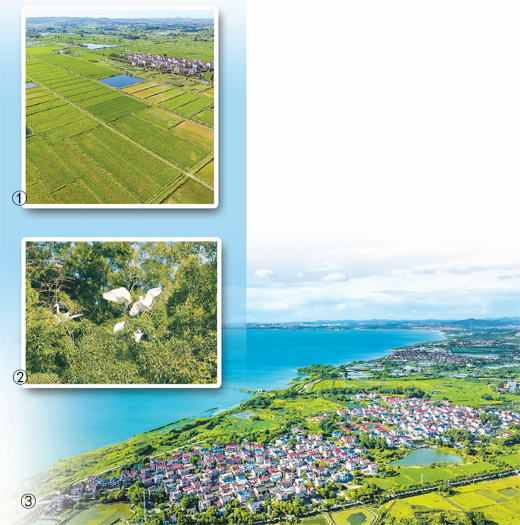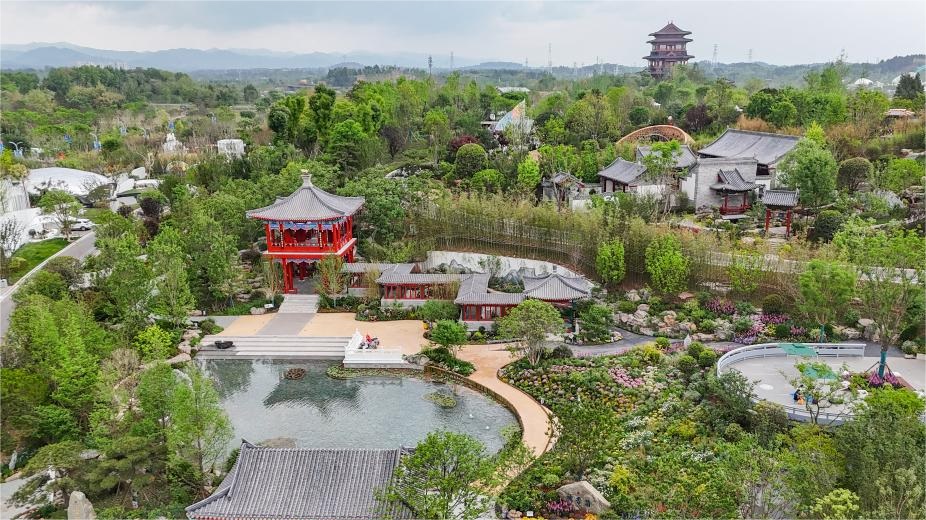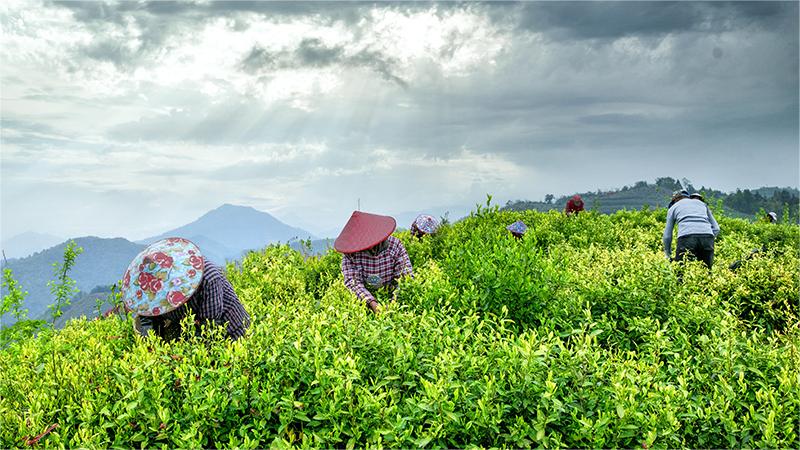E China's Jiangsu leads the way in issuing the first carbon credit certificate for the agriculture sector
In Nanjing, the capital of east China’s Jiangsu Province, the Gaochun district’s office of the leading group on carbon peaking and carbon neutrality made a pioneering move by awarding the first carbon credit certificate in the province’s agriculture sector to a rice cooperative.
In particular, the rice cooperative, which is situated in Hemujian village, Dongba subdistrict, successfully auctioned off a total of 130.67 tonnes of verified carbon dioxide emissions.
The auction’s starting price opened at 60 yuan (about $8.29) per tonne, with Hongbaoli Group, a local chemical and new material enterprise, winning the bid and securing the purchase at 9,800.25 yuan.

1. Photo shows rice fields in Hemujian village, Dongba subdistrict, Gaochun district, Nanjing, capital of east China's Jiangsu Province. (Photo/Liu Lie)
2. Photo shows a scene at a bamboo forest in Wutai village, Yaxi subdistrict, Gaochun district, Nanjing, capital of east China's Jiangsu Province. (People's Daily/Gao Xiaoping)
3. Photo shows the stunning view of Gaochun district, Nanjing, capital of east China's Jiangsu Province. (Photo/Liu Lie)
The rice cooperative has been growing organic rice since 2009, with its current rice planting area spanning about 2,600 mu (about 173.33 hectares).
In May 2022, the Ministry of Agriculture and Rural Affairs, in collaboration with the National Development and Reform Commission, issued a comprehensive implementation plan to bolster carbon emissions reduction and carbon fixation in agriculture and rural areas, calling for actions to cut methane emissions in rice fields.
Following this directive, two months later, Gaochun district partnered with the Ministry of Ecology and Environment’s (MEE) Nanjing Institute of Environmental Sciences, Nanjing Agricultural University, and Nanjing Guohuan Organic Product Certification Center Co., Ltd. to launch a carbon emissions reduction and carbon fixation pilot program on 500 mu of the rice cooperative’s organic rice fields to be selected as test fields.
To enhance this initiative, biochar, a kind of fertilizer produced during the pyrolysis process of straw, was applied precisely to the 500 mu of these organic rice fields, helping to reduce greenhouse gas emissions while improving soil conditions.
From Nov. 30, 2022 to Nov. 30, 2023, the project saw an average 15 percent reduction in pests and diseases incidences, a 16 percent decrease in direct greenhouse gas emissions, and a 51 percent reduction in net carbon emissions in the test fields, while average soil carbon fixation rates soared by 89 percent, according to Zhang Jibing, director of the Organic Food Development Center of the Ministry of Ecology and Environment (OFDC-MEE).
Zhang highlighted that these efforts resulted in the test fields generating a total carbon sink production of 130.67 tonnes of carbon dioxide equivalent during this period, significantly enhancing and showing obvious results in both carbon fixation and carbon emissions reduction.
"The rice yield grew 10 percent, the rice tastes better, and sales have increased significantly," said Wei Tongtian, Party chief of Hemujian village, who is also head of the rice cooperative.
Wei noted that last year the cooperative's sales revenue increased by 1 million yuan, with the income of each of its members rising by 1,700 yuan.
China's carbon market is comprised of the national carbon emissions trading market and the national voluntary greenhouse gas emissions reduction trading market.
In November 2023, a pilot plan was issued in the Yangtze River Delta’s demonstration area for integrated ecologically-friendly development.
The plan called for exploring agricultural carbon sink trading mechanisms, advancing the building of a system for evaluating the value of carbon sink products in the agriculture sector, and promoting the use of technologies for agricultural carbon emissions reduction and carbon fixation.
As a provincial-level pilot area for trialing mechanisms to realize the market value of green products, Gaochun district, in particular, has taken the lead in exploring carbon sink trading in the agriculture sector.
The voluntary greenhouse gas emissions reduction trading through competitive bidding in Gaochun marks the "first auction" of additional carbon sinks generated from the application of biochar in organic rice fields in China, said Liu Guocai, head of the Nanjing Institute of Environmental Sciences of the MEE.
Liu added that it was an important implementation milestone in successfully achieving the country's carbon peak and neutrality goals in the agriculture sector, serving as a useful reference for Jiangsu's voluntary greenhouse gas emissions reduction trading in the future.
This agricultural carbon sink trading also marks a breakthrough for Gaochun in realizing the market value of green products. In 2020, the district took the lead in launching a pilot program for measuring the gross ecosystem product (GEP) and subsequently became the only district-level local government participating in the formulation of national standards for calculating the GEP.
Hu Xueyi, deputy head of the district, said Gaochun will take this agricultural carbon sink trading as an opportunity to actively promote the use of technologies for reducing agricultural carbon emissions and carbon fixation.
Photos
Related Stories
- Accurate carbon accounting gives leg up to green transition
- Study reveals giant store of global soil carbon
- China works to promote energy conservation, carbon reduction in construction industry
- Guangdong carbon market closes lower
- Near-zero carbon demonstration zone in Hainan shows China's green practices
- Guangdong carbon market closes lower
- Green products seen during Boao Forum
Copyright © 2024 People's Daily Online. All Rights Reserved.









